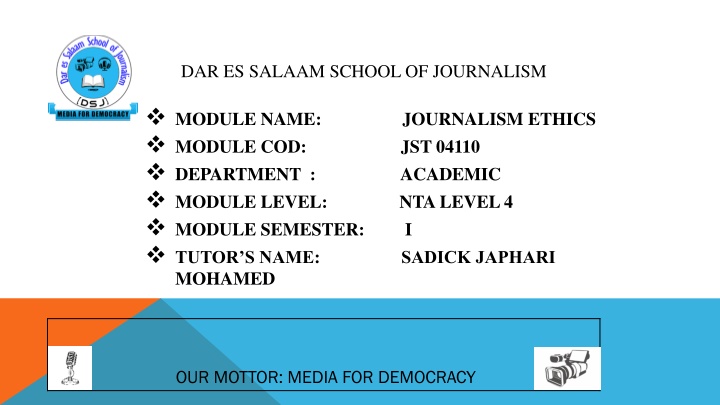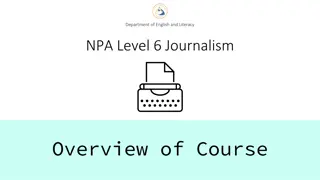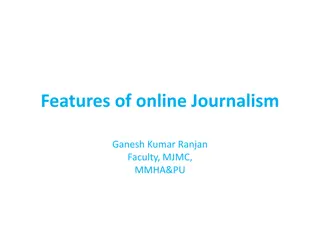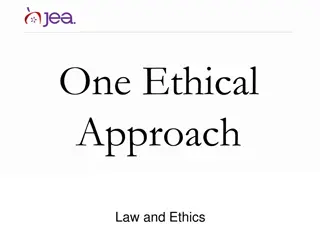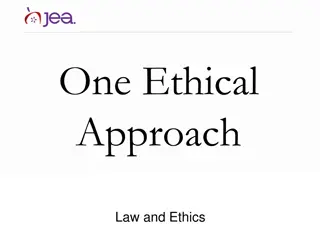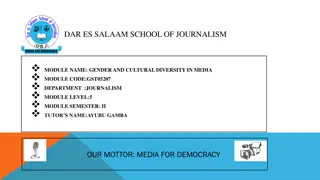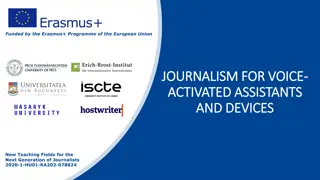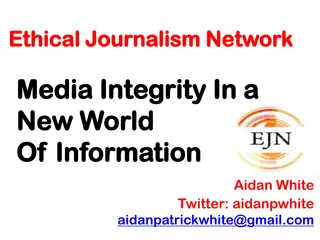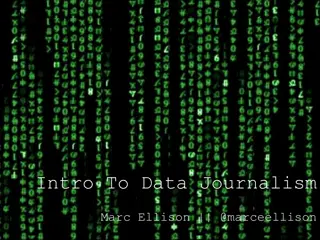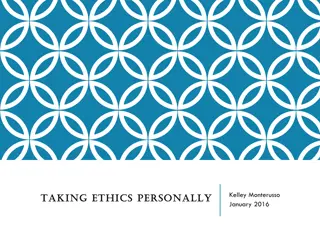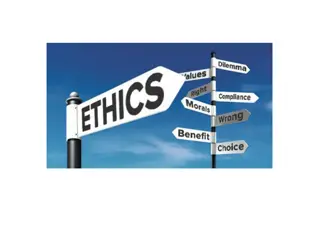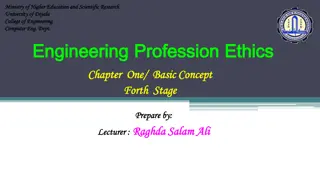Journalism Ethics: Defining Principles and Importance
Ethics play a crucial role in guiding the conduct of individuals, societal groups, and professionals. This module explores the fundamental principles of ethics in journalism, emphasizing the distinction between good and bad behaviors. Understanding what shapes ethics, including societal norms, values, and professional needs, is essential in upholding credibility and respectability. The necessity of ethics in journalism is highlighted, emphasizing its role in serving society efficiently, equitably, and justly. Topics covered include personal ethics, professional ethics, global ethics, and communication ethics.
Download Presentation

Please find below an Image/Link to download the presentation.
The content on the website is provided AS IS for your information and personal use only. It may not be sold, licensed, or shared on other websites without obtaining consent from the author.If you encounter any issues during the download, it is possible that the publisher has removed the file from their server.
You are allowed to download the files provided on this website for personal or commercial use, subject to the condition that they are used lawfully. All files are the property of their respective owners.
The content on the website is provided AS IS for your information and personal use only. It may not be sold, licensed, or shared on other websites without obtaining consent from the author.
E N D
Presentation Transcript
DAR ES SALAAM SCHOOL OF JOURNALISM MODULE NAME: JOURNALISM ETHICS MODULE COD: JST 04110 DEPARTMENT : ACADEMIC MODULE LEVEL: NTA LEVEL 4 MODULE SEMESTER: I TUTOR S NAME: SADICK JAPHARI MOHAMED OUR MOTTOR: MEDIA FOR DEMOCRACY
INTRODUCTION TO JOURNALISM ETHICS Defining Defining Ethics Ethics: refers to moral principles that govern a Ethics: refers to moral principles that govern a person s, social grouping, or professional behavior. person s, social grouping, or professional behavior. These principles help society distinguish between These principles help society distinguish between good and bad conduct good and bad conduct. . Ethics is only involved in voluntary human acts, Ethics is only involved in voluntary human acts, undertaken willingly with active intellect and undertaken willingly with active intellect and deliberation. deliberation. These These are therefore factors that raise the level of are therefore factors that raise the level of responsibility and accountability. Ethics does not responsibility and accountability. Ethics does not deal with involuntary acts done without person s deal with involuntary acts done without person s consent, will or intellect, as that would remove consent, will or intellect, as that would remove responsibility and accountability responsibility and accountability Ethics
INTRODUCTION TO JOURNALISM ETHICS WHAT SHAPES ETHICS WHAT SHAPES ETHICS Societal norms and values Political environment Economic development Religious inclination Training Professional needs Need for respectability Need for credibility General norms and values
INTRODUCTION TO JOURNALISM ETHICS Ethical inquiry covers a wide range of possible subjects, among them: Personal ethics: e.g questions about one s basic values and plan of life Professional ethics: principles and practices of major professions Ethics of sexual and gender relations Research ethics in academia and the private sector Global ethics: ethics of international affairs, human right Communication ethics, including media, public relations and journalism
WHY ETHICS IS NECESSARY IN JOURNALISM? All professions determined to serve humanity must have some kind of guidelines on how they ought to attend the society in an efficient, effective, equitable and just manner. As an honorable profession that performs a public service by ensuring the dissemination of knowledge, journalism also has its ethics.
Journalism ethics are the modes of behavior to which all branches of the media should attempt to adhere. These include print, electronic and online. Journalism ethics Is the subdivision of applied ethics dealing with the specific principles and standards of media, including broadcasting, film theatre, the arts, print media and the internet. Journalism ethics are moral standards that apply to the media. Media professionals use media ethics as a compass when discharging their duties. The standards are also used by the media as a device for shielding themselves from attacks directed at them from time to time by members of the public displeased by their work.
Media ethics relate to the application and evaluation of the principles and norms that guide journalism practice, with special attention to the most important problems in the field and contain both applied analysis and theory. Journalists often find themselves in situations that pose ethical dilemma. There are various guidelines which can help them make the right decisions. It is commonly agreed that ethical dilemmas result from conflicts arising between the values that people hold, the principles they use to make decisions and the duties they have to others or any combination of these.
The solution for these dilemmas always resolve around four dimensions: gathering all available facts; identifying the values one standards for ( professional, moral or socio-cultural) ; identifying one s guiding principles or philosophy; and deciding on people one ought to be loyal to (yourself, employer, profession and society). These dimensions are also known as determinants of morality.
Any Question? Any Question?
Full name: Sadick Japhari Mohamed Department: Academic Email Address: sadickjaphari2@gmail.com Phone number: 0654665655 CONTACT TUTOR IN CHARGE
